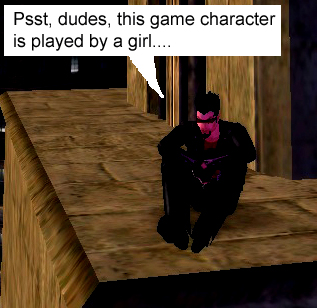
And now for something completely different…
I have a confession to make. I’m a huge geek. In fact, I am a gamer geek. Ah yes, from the days of table top D&D in someone’s basement in high school up unto present times, I have always loved games and being a gamer. Dragon Con? Origins? Gen Con? Been there, done that, why yes, even have the t-shirts. From the table top to the larp, from the arcade to the MMORPG, I have gone, seen and conquered. Street Fighter, Tekken, Call of Cuthulu, City of Heroes, Doom, Gears of War, Final Fantasy, Diablo, Werewolf the Apocalypse…these and many others have seen me get my inner geek on. I will admit, however, to date I remain WoW free!
Shoot, I am torn this weekend between real life events and double xp weekend on City of Heroes/Villains…you may not see much blogging out of me when the end of the week draws neigh!
But as a gamer geek girl, I want to share a few little observations that I’ve made about the male of the species when it comes to gaming, and I am sure the other gamer girls in the room will know of what I speak…though I am limiting this to MMORPG’s
Nine times out of ten when the game has customizable costumes and lots of choices in wardrobe, I can tell when a male is playing a female character and when a female is playing a female character. See, both might make the character attractive, but nine times out of ten, the female player will put her in…ahem…clothes. They might be street clothes, or super-hero-y clothes, or armor, or military looking gear…but the character is generally somewhat covered, whereas a male playing a female character will often make her as close to naked as possible. She’s a top dog tank type? So what, she’s still got a bikini on! Now sure enough, if you are going to spend countless hours staring at an animated backside it might as well be one you like, but when I team up with other players and one character is a 5’5’ brunette in full tactical gear and one is a 6’0” blonde in a corset and thigh high spike heel boots, I generally can guess which of those characters is actually played by a woman. Heh.
On teams, no matter who the team leader is, who’s quest/mission/instance it is, sure enough, if it is known that the leader of that team is in RL a woman, nine times out of ten some dude will try to take over and call all the shots and dictate how the whole thing should go. This, my friends, pisses me off big time. In CoH/CoV I often play with people I know in real life, and in most cases, I have higher level characters and more experience playing the game than they do…but it matters not, even on my missions one of the dudes will feel as though he must step up and run the show because he has a dick. At this point, I often fail to defend/tank for/ bail them out when shit gets heavy…a few resurrections (which I won’t do on them either) sometimes fixes the problem. Other times, a firm boot from the team sends the message.
Often times, I play male characters, and when doing so, when teamed up with people who do not know you in real life, when not using a chat tool like Vent, it is amazing the shit dude players will say because they look at your character and assume in real life you have a penis. Be wary male gamers, sometimes us girls play boys…and we really do not want to hear about the totally hot chick you saw today and what you wanted to do with her. This causes RL aggro, which then will be transferred to the game and onto your character. And if we ever team with your girlfriend? Watch out…
Do not assume women gamers want to role-play romance scenarios with you. I, for one, am there to kick ass and chew bubble gum. I do not play WoW, but man, have I heard some stories…then again, those elves do dance all sexy like…
And for all that is sane or holy…
Follow me here….
You ever been to a gaming con? As a woman?
What an experience. Having been to a few in my life, I can tell you that you run into a plethora of dudes who, um, need to get out more…from the guys who are convinced no women can actually game well, to those who want to know where your chain mail bikini is, to those who assume that since you role played with them that you want to fuck them. It is quite an adventure! No, not all gamer guys are like this, but dang, there are enough to make them worthy of notice…and…
Hangs head in shame…
I will admit that I totally won a Gears of War Tournament because the dude playing me had a hard time focusing on anything other than my boobs. I was in a dang AkiraT-shirt, but all the same…
I now open up the floor to the other gamer gals…what have you noticed when dealing with men in the world of gamer geekery???